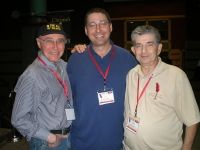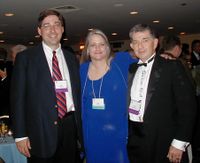Today, the Mystery Writers of America notified their members of the actions they are taking in response to Harlequin's manuscript critique business and their self-publishing venture:
Recently, Harlequin Enterprises launched two new business ventures aimed at aspiring writers, the Harlequin Horizons self-publishing program and the eHarlequin Manuscript Critique service (aka "Learn to Write"), both of which are widely promoted on its website and embedded in the manuscript submission guidelines for all of its imprints.
Mystery Writers of America (MWA) is deeply concerned about the troubling conflict-of-interest issues created by these ventures, particularly the potentially misleading way they are marketed to aspiring writers on the Harlequin website.
It is common for disreputable publishers to try to profit from aspiring writers by steering them to their own for-pay editorial, marketing, and publishing services. The implication is that by paying for those services, the writer is more likely to sell his manuscript to the publisher. Harlequin recommends the "eHarlequin Manuscript Critique Service" in the text of its manuscript submission guidelines for all of its imprints and include a link to "Harlequin Horizons," its new self-publishing arm, without any indication that these are advertisements.
That, coupled with the fact that these businesses share the Harlequin name, may mislead writers into believing they can enhance their chances of being published by Harlequin by paying for these services. Offering these services violates long-standing MWA rules for inclusion on our Approved Publishers List.
On November 9, Mystery Writers of America sent a letter to Harlequin about the "eHarlequin Manuscript Critique Service," notifying Harlequin that it is in violation of our rules and suggesting steps that Harlequin could take to remain on our Approved Publishers list. The steps outlined at that time included removing mention of this for-pay service entirely from its manuscript submission guidelines, clearly identifying any mention of this program as paid advertisement, and, adding prominent disclaimers that this venture was totally unaffiliated with the editorial side of Harlequin, and that paying for this service is not a factor in the consideration of manuscripts. Since that letter went out, Harlequin has launched "Harlequin Horizons," a self-publishing program.
MWA's November 9 letter asks that Harlequin respond to our concerns and recommendations by December 15. We look forward to receiving their response and working with them to protect the interests of aspiring writers. If MWA and Harlequin are unable to reach an agreement, MWA will take appropriate action which may include removing Harlequin from the list of MWA approved publishers, declining future membership applications from authors published by Harlequin and declaring that books published by Harlequin will not be eligible for the Edgar Awards.
We are taking this action because we believe it is vitally important to alert our members of unethical and predatory publishing practices that take advantage of their desire to be published. We respect Harlequin and its authors and hope the company will take the appropriate corrective measures.
The problem is not that Harlequin owns, or is affiliated with, a manuscript critique service or a self-publishing operation. The problem is how those services are integrated and promoted within their "legitimate" publishing operation…and how that integration potentially misleads, and takes advantage of, aspiring and established authors. The problem is further exacerbated by Harlequin allowing the manuscript critique service and the self-publishing operation to use the Harlequin name.
By integrating the pitch for the critique service into the actual text of their manuscript submission guidelines for all of their imprints — without indicating in any way that it's an advertisement and not a requirement or recommendation — and by giving the service the Harlequin name, they could mislead authors into thinking that:
a) paying for their critique service is a requirement for submitting manuscripts to Harlequin
b) that the editors you hire at eHarlequin Manuscript Critique Service are the same "romance professionals" who will be working with you on your manuscript at Harlequin.
c) paying for their critique service will give you an inside track at having your manuscript being accepted by Harlequin
With the Harlequin self-publishing service, Harlequin Horizons, they could mislead aspiring writers into believing that they are:
a) being published by Harlequin, only paying for it.
b) that they will be working with Harlequin editors
c) that they are actually being published by Harlequin when, in fact, it's an iUniverse book.
And by mentioning the Harlequin self-publishing service on the manuscript submission page for their "real" Harlequin, they are creating the potentially mis-leading impression that paying to have your book published by Harlequin is a pre-requisite or a short-cut to being published by the "real" Harlequin.
In my view, these actions go against all the professional and ethical standards that the MWA stands for.
The Romance Writers of America, in an act of real courage on behalf of their members, has also spoken out strongly this week against these practices, taking on the largest publisher in their genre. It will be interesting to see what Harlequin does next.
UPDATE (11/19/2009) : Harlequin has just announced that they are changing the name of their vanity press. That does not allay all of the MWA's grave concerns about this venture, but it is one step in the right direction.
UPDATE (11/19/2009): The Science Fiction Writers of America have just removed Harlequin from their Approved Publishers list and have released a statement expressing their outrage.
UPDATE (11/22/2009) Novelists Inc. put out with a statement today warning writers to avoid vanity presses and calling on "legitimate" publishers not to engage in predatory publishing practices.
UPDATE (11/23/2009) The Horror Writers Association has also issued a statement condemning Harlequin's vanity press. You can find the complete text in the comments below.
UPDATE: Sisters-in-Crime released a statement, acknowledging that Harlequin Horizons (now DellArte) is a vanity press and may not present the best option for those interested in self-publishing. The complete text of the statement is in the comments below. The International Thriller Writers have declined to issue any sort of statement regarding the Harlequin matter.


